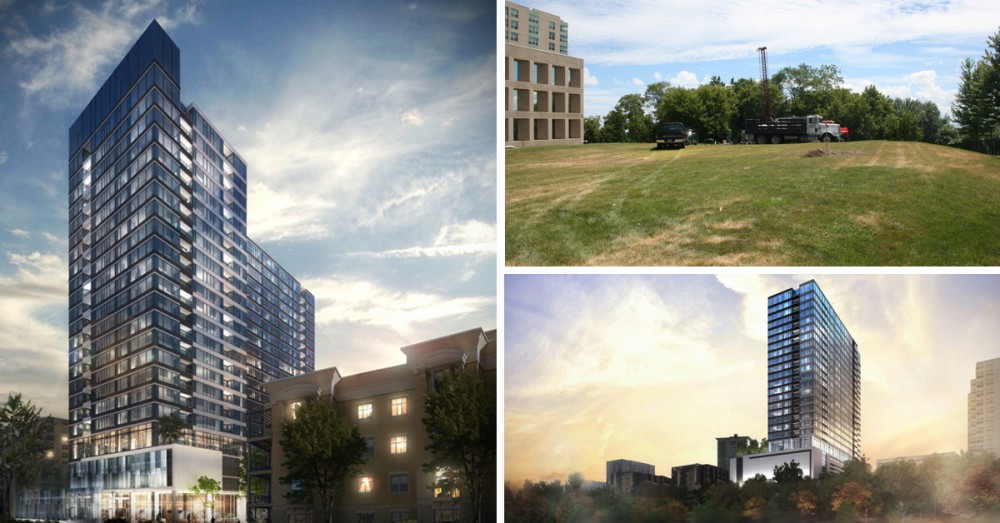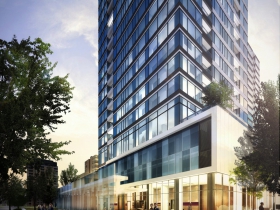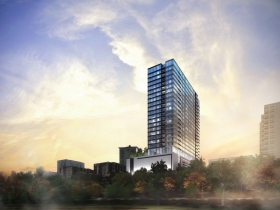Mandel Delaying Portfolio Because of Market Saturation
Lakefront tower has been reduced in height since 2016 proposal, but firm still believes too much competition exists.
A proposed apartment tower overlooking Lake Michigan is being delayed until at least 2025.
The Mandel Group unveiled a plan in 2016 to develop a 24-story apartment tower, dubbed Portfolio, at 1350 N. Prospect Ave. The building, in its original format, was to contain a mix of studio, one, two and three bedroom units targeted at empty nesters.
The latest report shows that Mandel plans to sit tight for quite some time. The firm cited three other developments that it feels would compete for the same tenants, The Couture, Ascent and 333 N. Water St., as a reason to wait.
“We firmly believe the high-rise market for luxury apartments will be saturated in the midterm (2022-2025) when these developments complete construction and lease up,” wrote Mandel CEO Barry Mandel and Milwaukee Development Corporation President Pat O’Brien, a project partner. “According, we continue to re-evaluate our options.”
In other recent years, Mandel has delayed action citing an unsuccessful attempt to land a city subsidy or private financing. Those remarks first appeared in a 2018 letter and were emphasized in the 2019 letter.
Then-City Development Commissioner Rocky Marcoux, in early 2020, said he was okay with a smaller building in exchange for no subsidy. Under Mayor Tom Barrett, Milwaukee only provided a subsidy to a handful of market-rate housing projects. Those subsidized include The Couture, a fact cited in the most recent letter by Mandel. A tax incremental financing district is supporting the construction of the base of The Couture, which is to include a streetcar station. The Hop’s northern terminus is directly across the street from the Portfolio site.
The development, in its high rise form, is expected to take two years to construct. In 2018, a 20-story version of the project was estimated to cost $90 million to develop. But construction costs have risen quickly since the pandemic took hold, a fact that contributed to the reconfiguration of the competing 333 N. Water St. proposal.
The Portfolio site was once home to a Bauhaus-style building that housed the Layton School of Art. That building was demolished in 1970 for the planned Park East Freeway that was to encircle Downtown with an elevated highway. Despite relocating, the Layton School of Art never recovered, going from high profile to closed by 1974 (though the school was essentially transformed into the Milwaukee Institute of Art & Design). We first reported Mandel was exploring building a tower there in August 2013 when soil testing equipment was spotted on the site. Mandel acquired the site as part of a larger development of apartments, condominiums and a retail center that stretches from N. Jefferson St. to the lakefront along E. Ogden Ave. The creation of Burns Commons was part of the late 1980s-early 1990s development. The Layton School site is the only remaining vacant parcel.
Representatives of Mandel did not respond to a request for additional comment by the time of publication.
2016 Renderings
Political Contributions Tracker
Displaying political contributions between people mentioned in this story. Learn more.
- December 23, 2020 - Tom Barrett received $500 from Rocky Marcoux
- December 1, 2020 - Tom Barrett received $500 from Barry Mandel
- December 22, 2018 - Tom Barrett received $500 from Rocky Marcoux
- December 29, 2017 - Tom Barrett received $500 from Rocky Marcoux
- March 1, 2017 - Tom Barrett received $400 from Rocky Marcoux
Eyes on Milwaukee
-
Church, Cupid Partner On Affordable Housing
 Dec 4th, 2023 by Jeramey Jannene
Dec 4th, 2023 by Jeramey Jannene
-
Downtown Building Sells For Nearly Twice Its Assessed Value
 Nov 12th, 2023 by Jeramey Jannene
Nov 12th, 2023 by Jeramey Jannene
-
Immigration Office Moving To 310W Building
 Oct 25th, 2023 by Jeramey Jannene
Oct 25th, 2023 by Jeramey Jannene
























The article quotes Mandel as Mandel complaining that he could not proceed with his project “due to the reluctance of the City to provide financial support.” Why is it that big money developers of both residential and commercial projects feel entitled to some financial handout from local governments for their “can’t miss” projects. If the projects are that good, let them solely take the risk. Not long ago the City of Glendale got stuck with a $57,000,000 mortgage because the “can’t miss” project of Bayshore Town Center went bankrupt.